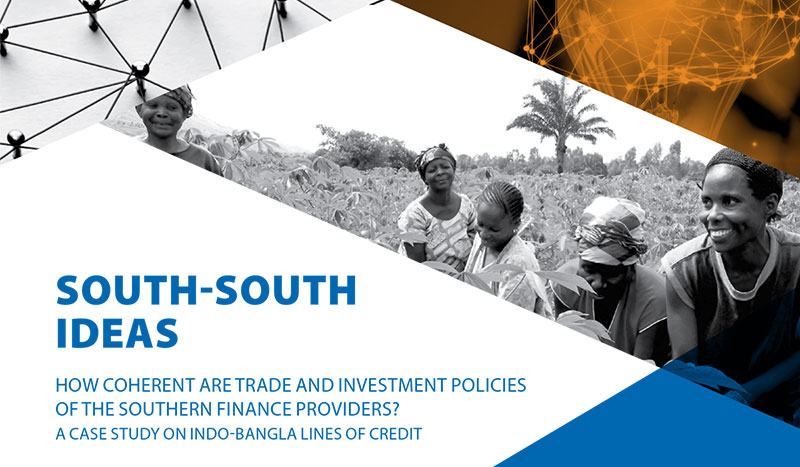
Dr Debapriya Bhattacharya, Distinguished Fellow, CPD, Professor Mustafizur Rahman, Distinguished Fellow, CPD, and Mr Syed Muhtasim Fuad, Former Programme Associate, CPD, authored a research study titled, “How Coherent Are Trade and Investment Policies of the Southern Finance Providers?: A Case Study of Indo-Bangla Lines of Credit”. The United Nations Office for South-South Cooperation (UNOSSC) and the United Nations Development Programme (UNDP) sponsored the research project under the “South-South Global Thinkers- the Global Coalition of Think-Tank Networks for SSC”.
This study uses the Indo-Bangla lines of credit (LoCs) as a test case to assess the extent to which the projects undertaken by the LoCs are aligned with Bangladesh’s national priorities. Analytical framework of the study is based on the existing literature that deals with South-South cooperation (SSC), coherence and SDG delivery.
Specific questions included in the proposed framework are: (a) whether the trade and investment flows are aligned with national development strategies in recipient countries (national policy alignment); (b) the extent to which the SSC-supported projects are attuned to the priorities of the recipient countries (priority alignment); (c) whether the selected projects and deliverables are aligned with SDG implementation strategies and plans (SDG coherence); (d) whether the process being pursued (conditionalities) by the provider countries imposes binding constraints for recipient countries (process efficiency); and (e) whether accountability frameworks are in place to ensure that the projects deliver the expected outputs (accountability concerns).
The past two decades have seen SSC and triangular cooperation grow at a spectacularly fast pace in terms of the scale, scope and diversity of the modalities and the amount of resources involved. The issue of the development effectiveness of SSC has emerged prominently in the development-effectiveness discussions. This is in the view of large-scale involvement of financial flows moving horizontally from Southern country to Southern country under a new dispensation. There is a renewed need to examine issues of coherence to obtain insights that could be used to increase the efficacy of SSC.
Key findings of the study show:
- Overall, the projects selected for financing under the LoCs are aligned with Bangladesh’s policies and priorities in the areas of trade and investment.
- The LoC projects will contribute towards the achievement of a number of SDGs.
- Embedding conditionalities into Indian LoCs has adverse implications in terms of forgone benefits and reduced returns on investment.
- Slow progress in project implementation results in cost overruns, which must be borne
by the recipient country.
Thus, the study recommends the followings:
- Revisit the processing of South-South cooperation.
- Develop and strengthen institutional architecture for implementing initiatives under the
- Take steps to increase negotiating capacity.
- Engage local government bodies, civil society and the private sector in implementing
SSC projects. - Promote a Southern initiative to design a SSC framework.
Click here to find the publication.



